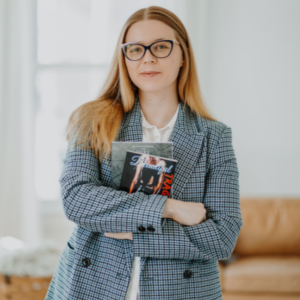Poets of the Dark: Interview with Brianna Malotke
 Brianna Malotke is a member of the Horror Writers Association based in Washington. Her poetry is in The Spectre Review and The Nottingham Horror Collective. You can find more of her horror work in the anthologies Beautiful Tragedies 2, The Dire Circle, Under Her Skin, Their Ghoulish Reputation, Out of Time and HorrorScope. In fall of 2022 her debut poetry collection, Don’t Cry on Cashmere, was published by Ravens Quoth Press. Looking to 2023, she will be a “Writer in Residence” at the Chateau d’Orquevaux in France and her first horror poetry collection Fashion Trends, Deadly Ends will be released.
Brianna Malotke is a member of the Horror Writers Association based in Washington. Her poetry is in The Spectre Review and The Nottingham Horror Collective. You can find more of her horror work in the anthologies Beautiful Tragedies 2, The Dire Circle, Under Her Skin, Their Ghoulish Reputation, Out of Time and HorrorScope. In fall of 2022 her debut poetry collection, Don’t Cry on Cashmere, was published by Ravens Quoth Press. Looking to 2023, she will be a “Writer in Residence” at the Chateau d’Orquevaux in France and her first horror poetry collection Fashion Trends, Deadly Ends will be released.
What sparked your interest in horror poetry? Was there a particular event or work that inspired you to delve into the darker side of poetry?
Poetry has always been a love of mine. I enjoy the challenge that comes with story-telling in such a limited number of words but also the playfulness and fun to use different formats on a page. As for horror, I grew up reading the “Scary Stories to Tell in the Dark,” and I’ve been hooked ever since. I think my little niche within horror poetry is in body horror and featuring a lot of femme killers.
Can you describe your creative process when writing horror poetry? Do you have any rituals or techniques that help you tap into your darkest fears and bring them to life on the page?
There are so many different fears and situations to work with in storytelling. My creative process is definitely just diving into scary situations in my mind and seeing what pops. I tend to have pretty vivid dreams, especially after watching horror movies. I’ll write down some of the weirder dreams and use that as a starting point if I’m stuck. I will say I find a lot of inspiration in art and media (Hannibal TV series anyone? I’ve never been afraid of being buried alive to grow and maintain a mushroom garden, but here we are now with new nightmares.)
How do you balance the need to be evocative and disturbing with the constraints of poetic structure and form? Are there any particular strategies you use to create tension and build suspense in your horror poems?
I love the flexibility that poetry allows for structure and form. You can be creative and create your own format. You can add in short lines for emphasis, draw out a long thought over a whole stanza, or put certain words in italics. Poetry allows me to make my own rules in a way. I love adding an em dash to my poetry for certain emphases and building suspense. I typically hand write my poems and when I type them up, I’ll see what they look like on the page. Then I like to play around with the syllable count for lines and even the patterns that I can make within stanzas and the overall poem. I find that sometimes changing the syllables and where you break lines can help add suspense to your pieces.
Who are some of your favorite horror poetry inspirations? Are there any authors or poets whose work you admire and draw inspiration from when crafting your own dark verse?
When working on my own dark verse, I really rely a lot on visual inspiration rather than other authors’ written work. My favorite horror poetry inspirations usually come from art, mainly paintings or historical fashion. I follow a lot of museum-oriented Instagram accounts and love seeing all the different visuals pop up. Along with that I enjoy reading horror poetry anthologies for the variety of voices they contain. Reading the different styles helps me really focus in on my own work and what I want to accomplish with it.
Finally, what advice would you give to aspiring horror poets who want to explore the genre? Are there any particular challenges or pitfalls they should be aware of, and how can they overcome them to create truly terrifying poetry?
My advice is to dive right in! Have a fear? Explore it with your writing.
Read a variety of horror poetry and see what sparks something for you. It’s okay to rework things too. When I first started focusing on horror poetry I struggled with what to include or not to include in a single poem. Such as when to hold back, be a little secretive instead of blunt, etc. It was during the time that I participated in the HWA Mentor Program that I really learned to look at things in a different way. My mentor would have me mix up my original poems, even if I loved it and thought it was a finished piece. He would have me edit and redo bits and pieces until I had multiple versions. In the end it was an excellent process because I could take the one story in all these different routes and end up with something I loved even more. So don’t be afraid of editing and reworking things.



